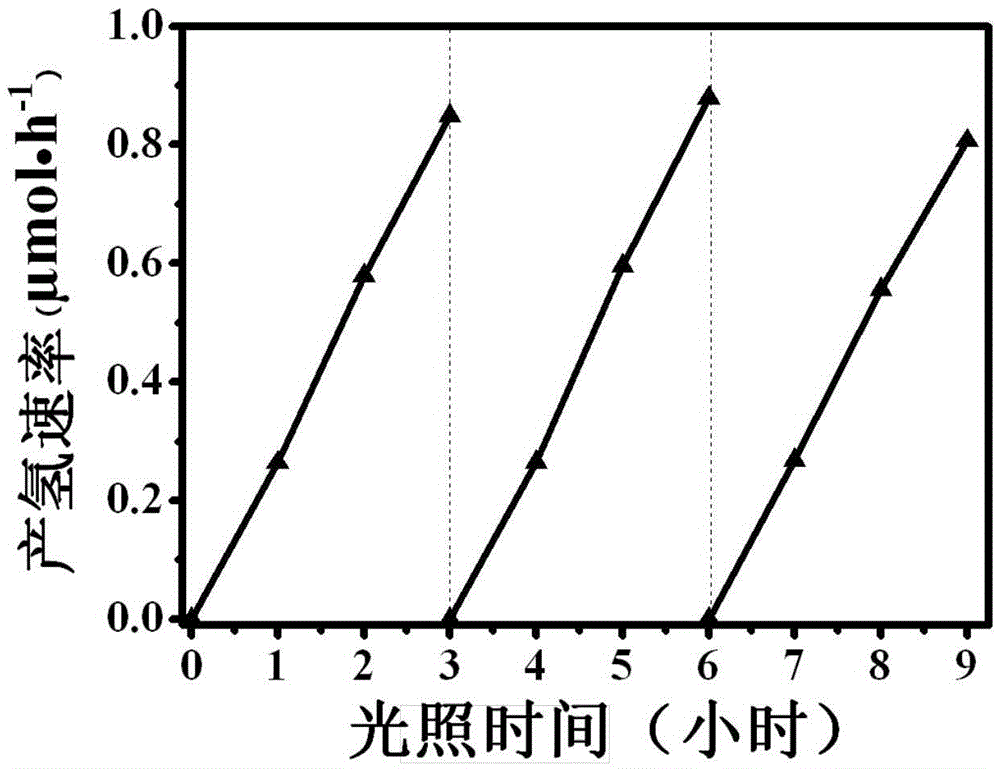Titanium dioxide-platinum-tricobalt tetraoxide tri-element composite photocatalytic material and preparation method thereof
A three-cobalt tetroxide ternary, composite photocatalysis technology, applied in metal/metal oxide/metal hydroxide catalysts, chemical instruments and methods, physical/chemical process catalysts, etc., can solve problems such as reducing photogenerated carrier recombination, etc. To solve the effect of easy recombination of electron holes
- Summary
- Abstract
- Description
- Claims
- Application Information
AI Technical Summary
Problems solved by technology
Method used
Image
Examples
Embodiment 1
[0034] 1) Quickly add 4.5mL of hydrofluoric acid into 25mL of tetrabutyl titanate, stir the mixed solution under the action of a magnetic stirrer for 1 hour until the solution is evenly mixed, and then transfer the mixed solution to a 100mL polytetrafluoroethylene liner In the hydrothermal reaction kettle, the hydrothermal reaction was carried out at 180°C for 24 hours, and the obtained precipitate was washed repeatedly with distilled water and ethanol, then dried in an oven at 80°C for 16 hours, and ground, and placed in a muffle furnace at 450 ℃ for 2 hours to obtain titanium dioxide nanosheets.
[0035] 2) Preparation of titanium dioxide nanosheets with platinum nanoparticles deposited on the surface: 50 mg of the titanium dioxide powder obtained above was added to 80 mL of a mixed solution of water and methanol (methanol: water = 1:3), and ultrasonically dispersed for 15 minutes to uniformly disperse the titanium dioxide in the In the above mixed solution, accurately measu...
Embodiment 2
[0047] 1) Quickly add 3mL of hydrofluoric acid into 25mL of tetrabutyl titanate, stir the mixed solution under the action of a magnetic stirrer for 1 hour until the solution is evenly mixed, then transfer the mixed solution to a 100mL Teflon-lined In a hydrothermal reaction kettle, conduct a hydrothermal reaction at 170°C for 24 hours, and the obtained precipitate is washed repeatedly with distilled water and ethanol, then dried in an oven at 80°C for 16 hours, and ground, and placed in a muffle furnace at 450°C After calcining for 2 hours, titanium dioxide nanosheets can be obtained.
[0048] 2) Preparation of titanium dioxide nanosheets with platinum nanoparticles deposited on the surface: 50 mg of the titanium dioxide powder obtained above was added to 80 mL of a mixed solution of water and methanol (methanol: water = 1:1), and ultrasonically dispersed for 15 minutes to uniformly disperse the titanium dioxide in the In the above mixed solution, accurately measure 0.065mL ch...
Embodiment 3
[0053] 1) Quickly add 9mL of hydrofluoric acid into 25mL of tetrabutyl titanate, stir the mixed solution under the action of a magnetic stirrer for 1 hour until the solution is evenly mixed, and then transfer the mixed solution to a 100mL Teflon-lined In the hydrothermal reaction kettle, the hydrothermal reaction was carried out at 160°C for 36 hours, and the obtained precipitate was washed repeatedly with distilled water and ethanol, then dried in an oven at 80°C for 16 hours, and ground, and placed in a muffle furnace at 500°C After calcining for 3 hours, titanium dioxide nanosheets can be obtained.
[0054] 2) Preparation of titanium dioxide nanosheets with platinum nanoparticles deposited on the surface: 50 mg of the titanium dioxide powder obtained above was added to 80 mL of a mixed solution of water and methanol (methanol: water = 1:3), and ultrasonically dispersed for 15 minutes to uniformly disperse the titanium dioxide in the In the above-mentioned mixed solution, ac...
PUM
| Property | Measurement | Unit |
|---|---|---|
| Average length | aaaaa | aaaaa |
| Thickness | aaaaa | aaaaa |
| Particle size | aaaaa | aaaaa |
Abstract
Description
Claims
Application Information
 Login to View More
Login to View More - R&D
- Intellectual Property
- Life Sciences
- Materials
- Tech Scout
- Unparalleled Data Quality
- Higher Quality Content
- 60% Fewer Hallucinations
Browse by: Latest US Patents, China's latest patents, Technical Efficacy Thesaurus, Application Domain, Technology Topic, Popular Technical Reports.
© 2025 PatSnap. All rights reserved.Legal|Privacy policy|Modern Slavery Act Transparency Statement|Sitemap|About US| Contact US: help@patsnap.com



